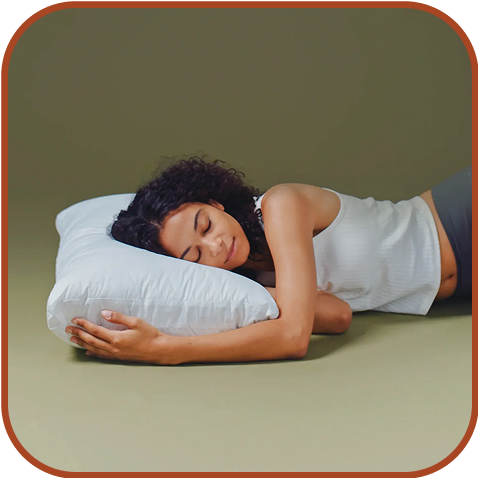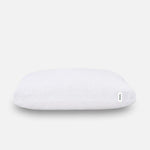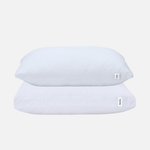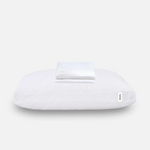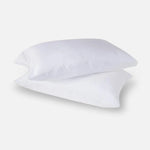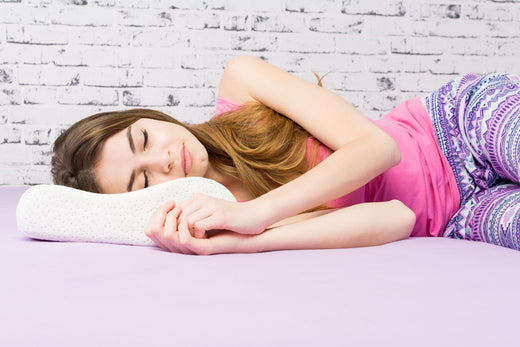An ergonomic bed pillow can mean the difference between a painful neck the next morning or feeling little to no pain at all upon waking up.
The types of pillows people use can vary widely. Some people like big, fluffy pillows, while for others, that type can lead to excruciating neck pain. Others like a super flat pillow.
You’ll see a wide variety of pillows -- there are curved, contour, and cervical pillows, just to name a few. For some, nothing can beat a memory foam pillow for neck pain.
It can be tricky knowing which one would be best for you. Let’s look at what ergonomic pillows can do for you and how your sleeping position and mattress play a role.
What Is an Ergonomic Pillow?

An ergonomic sleeping pillow is one that is specially created to complement the sleeper’s normal position when they’re resting. By cradling the contours created by their position and body alignment, an ergonomic pillow cuts down on tension in their body from staying in one position for a length of time. It will support the neck, no matter what position you sleep in.
That’s why an ergonomic pillow is often considered the best pillow for sleeping. They can also be beneficial when you’re awake if you use a pillow for posture. A good posture pillow should support you in all the right places, leading to fewer aches and pains that can sometimes result from sitting too long.
Sleeping Positions and Pillows
We all have our favourite sleeping positions. While our spouse might be the type to sleep only on their back, if we tried that, we could be in severe pain the next morning. And, if you’re a stomach sleeper, you might have people wondering how in the world you can do that.
Before looking at pillow types, we need to first examine sleeping positions. That’s because certain types of pillows work better for one sleeping position than another.
Here are the common types of sleeping positions:
- Back: This is a common way to sleep, but it is known to aggravate snoring and sleep apnea. You might also see it referred to as the supine position.
- Side: This position is also called lateral. It is said to be the most popular sleeping position.
- Stomach: Sleeping on your stomach is the least popular style of sleeping. It can also lead to some severe neck and back pain.
No matter what position you’re sleeping in, you should use whatever pillow feels comfortable to you. But you may have to test a few until you find the right one.
Here are some guidelines to follow that may help you.
- For back sleeping: Your pillow should give support for the cervical spine, meaning cushioning for your head, neck, and shoulders. You may do better with a thinner pillow than you would use if you were sleeping on your side. You might want a second pillow to place behind the knees to cut down on the strain your back might feel. Or, invest in an ergonomic back pillow for added lumbar support.

- For side sleeping: Side sleepers may want to look for a pillow that gives enough support for your head and neck that the spine keeps a straight line. That means using a relatively thick pillow in many cases, or a specially designed ergonomic side sleeper pillow. You may also find comfort from putting a pillow between your knees, too, for added spine support.
-
For stomach sleeping: You may want to find another sleeping position as this one can be highly stressful on your body. But if you are stuck on using this position, consider using a very flat pillow for your head and another flat pillow below your pelvis or abdomen to help your back keep proper alignment. An ergonomic head pillow can help prevent neck pain by moulding perfectly to the shape of your head.
Pillows and Health Issues
Your pillow can trigger allergy flares. If you have allergies, you may want to avoid down- or feather-filled pillows. You may also want to look for one that doesn’t support mould. Instead, you can look for those that are resistant to dust mites and mould.
Even if you don’t have allergies, choosing the wrong pillow can create or exacerbate other health conditions, including:
- Neck pain: The neck pain can get so severe it can potentially lead to other problems such as cervicogenic headaches, and tingling in the hands. According to research, ensuring you have the right pillow for your sleeping position can improve sleep quality, reduce neck pain and improve spinal alignment.
- Interference with sleep apnea treatment: Your pillow and sleeping position could put you into a position where it closes your airway off a bit or knocks your mask off.
-
Sleep deprivation: If you can’t get comfortable enough to sleep or to sleep for long, you can soon be facing sleep deprivation. A lack of sleep can lead to all sorts of health problems, including obesity, diabetes, cancer, and anxiety or depression. If you feel anxious or depressed because of less sleep, perhaps you should try a weighted blanket to see if it helps.
How Does the Right Pillow Affect Sleep?

The right pillow can cut down on back and neck pain. By eliminating some of that discomfort, you’ll be doing more than just improving how you feel during waking hours. You’ll also be able to sleep better.
The right ergonomic bed pillow can help you fall asleep faster, and stay asleep longer without waking or having to change positions because you’re uncomfortable.
How Does Your Mattress Affect A Pillow?
After taking into account your sleeping position, it’s now time to turn your attention to your mattress. Depending on the type of mattress you own, whether that’s firm or soft, you will need to choose your pillow accordingly.
Firm mattresses: prevent your body and shoulders from sinking into them. As such taller, softer pillows are best, so they can adapt to the weight and pressure of your head.
Soft mattresses: allow your body and shoulder to sink into them. As such, lower, firmer pillows are best, to keep your head and neck aligned.
How To Choose the Right Ergonomic Pillow
There are several features you should look at, including:
- Comfort: It’s all about the feel of a pillow. If you try it out and it doesn’t feel right, you may want to keep looking. You should feel instantly comforted and supported when you try it, but you should also feel less pain upon waking in the morning when you have a good pillow.
- Filling: Pay attention to any allergies you have, staying away from down if they aggravate your symptoms. You might be okay if you stick to hypoallergenic down. You can use synthetic pillow fillings or polyester filling too.
- Cost: The price will be influenced by the filling you choose. Down can be expensive. Synthetic will tend to be cheaper, but these pillows won’t last as long as down-filled ones will. Polyester is a good choice if you’re wanting a flat pillow because these will continue to flatten more as you own them. You can also opt for cotton, latex, memory foam, or wool-filled pillows.
-
Special features: Pay attention to things like whether your pillow will retain heat when you’re sleeping. That can be important if you are a heavy sweater. You might also consider if your pillow will hold up well to cleaning, or it is has been treated to make them good for people with allergies.
Wrapping Up Our Pillow Talk
Pillow selection can make a big difference in how comfortably you sleep. Knowing how to choose the right pillow and why it matters is your first step in choosing wisely.
Your pillow should be your friend, not your enemy, when it comes to resting well. Focus on your comfort level when you test it out, any medical concerns you might have, as well as what types of filling are used. And pay attention to what position you sleep in -- that can give you an indication of how fluffy or flat you might want your pillow to be.
